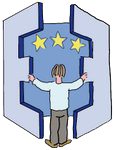Ethics at the ESS
The aim of non-denominational ethics teaching is “ethics teaching based on freedom of conscience and it is not based on any particular philosophical reference”.
At primary level (S1 to S3), this teaching is carried out in Language 1, covering two periods per week. The students are encouraged to reflect on their personal development (transition to secondary school and adolescence) and their relationships with others within family, school and city groups (their rights, duties, authority, etc.)
From S4 and up to S7, teaching is carried out in Language 2 and covers one period per week.
At secondary level (S4-S5), students reflect more broadly on societal issues such as cultural and religious differences, issues with communication and inclusion/exclusion, tolerance and its limits. It also includes individual rights and resulting responsibilities.
At the higher education level (S6-S7), the programmes focus on democracy, its founding values (national and European citizenship, justice, solidarity…) and the dangers that threaten it (extremism, weakening of institutions, terrorism, etc.)
Throughout this teaching, learning critical thinking, debating, and discussion are developed in the school itself and through various events and competitions.
The ethics grades do not count towards promotion to the next level of education and there is no ethics test in the European Baccalaureate.

